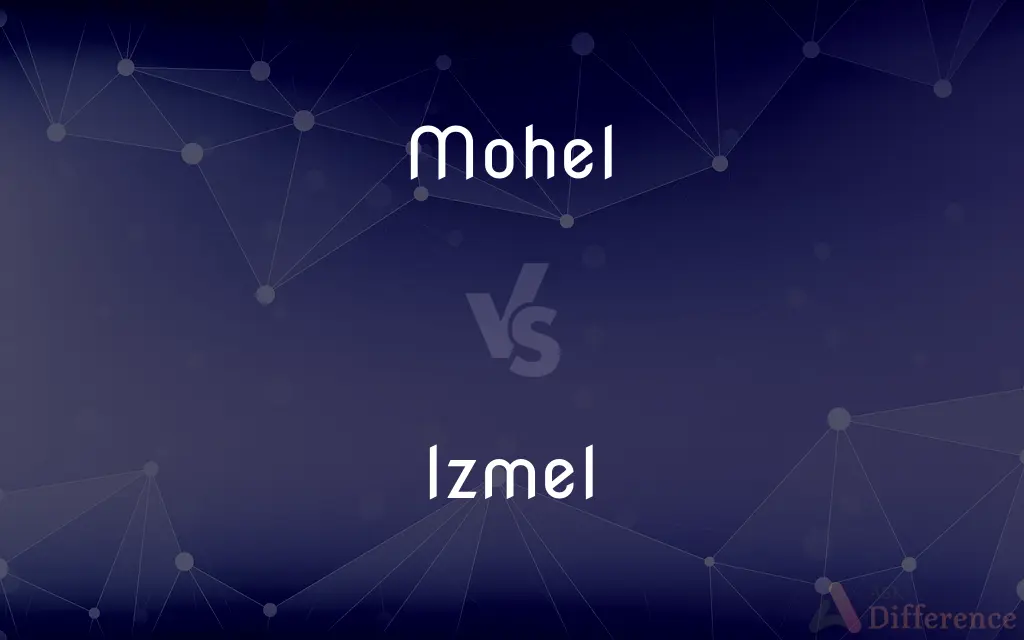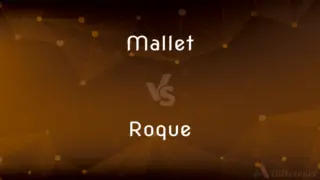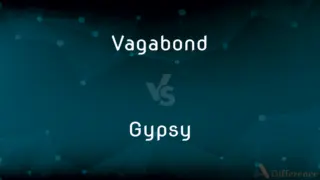Mohel vs. Izmel — What's the Difference?
By Fiza Rafique & Urooj Arif — Updated on April 24, 2024
A "mohel" is a person trained to perform the Jewish ritual of circumcision, using specialized tools including the "izmel," which is a surgical knife specifically designed for this purpose.

Difference Between Mohel and Izmel
Table of Contents
ADVERTISEMENT
Key Differences
A "mohel" is an individual, often a rabbi or trained religious practitioner, who performs brit milah, the Jewish circumcision ceremony. This role requires not only medical skills to ensure the procedure is safe and hygienic but also knowledge of the religious significance of the ritual. On the other hand, an "izmel" is the tool traditionally used by a mohel during the circumcision. It is a specially designed surgical knife that ensures precision and cleanliness during the procedure.
The training of a mohel includes both religious education and medical instruction, emphasizing the ritual and ethical requirements of Judaism. This ensures the circumcision is performed not only as a medical procedure but as a significant religious act. Conversely, the izmel, while a crucial part of the ceremony, is simply an instrument and has no intrinsic religious or ethical training associated with its use.
In the context of a brit milah ceremony, the mohel is central, leading the ritual, reciting prayers, and performing the circumcision. The izmel, while essential for the actual cutting, serves as a tool in the hands of the mohel and does not have an independent role in the ceremony. While the mohel engages with the family and community, providing explanations and ensuring the ritual's significance is communicated and respected.
Regarding care and maintenance, a mohel must maintain their skills and knowledge through ongoing practice and adherence to both medical and halachic (Jewish law) standards. The izmel, as a physical object, requires physical care including proper sterilization and handling to maintain its precision and hygiene, critical for safe circumcision practices.
In religious texts and teachings, the mohel is often discussed in terms of their spiritual and communal role, emphasizing their responsibilities and the trust placed in them by the community. The izmel, however, is mentioned in practical terms, focusing on its function and the requirements for its care to ensure it meets the necessary standards for use in a sacred act.
ADVERTISEMENT
Comparison Chart
Nature
Person trained for circumcision
Surgical knife used in circumcision
Training
Medical and religious
N/A
Role in Ceremony
Performs and leads the circumcision ritual
Used as a tool during the circumcision
Maintenance
Ongoing training and religious study
Requires sterilization and care
Significance
Spiritual and communal leader
Practical and functional tool
Compare with Definitions
Mohel
A trained practitioner who performs Jewish circumcisions.
The mohel conducted the brit milah with precision and care.
Izmel
A tool that embodies the practical aspects of the ritual.
The izmel, while a simple instrument, plays a critical role in the religious ceremony.
Mohel
Plays a crucial role in the Jewish ritual of circumcision.
The mohel recited blessings and explained the ceremony’s significance to the family.
Izmel
Designed for precision and safety in the procedure.
The design of the izmel ensures minimal discomfort during the circumcision.
Mohel
Responsible for the safety and religious appropriateness of the procedure.
As a mohel, his priority is maintaining a balance between religious tradition and medical safety.
Izmel
Requires careful handling and maintenance.
After each use, the izmel is meticulously cleaned and stored.
Mohel
Often a rabbi or someone deeply knowledgeable in Jewish law.
The community respects him not only as a rabbi but also as a skilled mohel.
Izmel
Essential for performing the physical aspect of brit milah.
Using the izmel, the mohel performed the circumcision quickly and efficiently.
Mohel
Engages with families to prepare them for the ritual.
The mohel visited the family's home to discuss the upcoming brit milah.
Izmel
A specialized knife used in Jewish circumcision rituals.
The mohel carefully sterilized the izmel before the ceremony.
Mohel
A mohel (Hebrew: מוֹהֵל [moˈhel], Ashkenazi pronunciation [ˈmɔɪ.əl], plural: מוֹהֲלִים mohalim [mo.haˈlim], Aramaic: מוֹהֲלָא mohala, "circumciser") is a Jew trained in the practice of brit milah, the "covenant of circumcision."
Mohel
One who performs circumcision on a Jewish male as a religious rite.
Mohel
(Judaism) The person who performs the circumcision in a Jewish bris.
Common Curiosities
How does one become a mohel?
Becoming a mohel involves medical training in circumcision techniques as well as study under a practicing mohel to learn the religious practices and prayers.
Is a mohel always a rabbi?
Not always; while many mohels are rabbis, a mohel can be anyone trained in the necessary medical and religious procedures.
Can a mohel refuse to perform a circumcision?
Yes, a mohel can refuse to perform the procedure if there are health risks involved or if the necessary preparations according to halachic law have not been met.
Can anyone use an izmel?
While technically anyone could use an izmel, it is specifically designed for use by a trained mohel during a brit milah.
How often does a mohel perform circumcisions?
This can vary widely based on the community size and demand. Some mohels perform circumcisions regularly, while others might do so less frequently.
Why is the izmel preferred over other surgical knives in a brit milah?
The izmel is preferred because it is designed specifically for the precision required in a brit milah, ensuring the procedure is performed efficiently and safely.
What qualifications does a mohel need?
A mohel must be trained medically to perform circumcisions safely and must also understand the religious aspects of the ceremony.
What care does an izmel require?
An izmel requires regular sterilization and sometimes sharpening to ensure it remains safe and effective for use in circumcisions.
What is the significance of the izmel in Jewish tradition?
The izmel is significant as the tool that physically enacts the covenant of circumcision, a key element in Jewish religious tradition.
How is an izmel different from regular surgical knives?
The izmel is specifically designed for the circumcision procedure, optimized for quick, precise cuts necessary for the ritual.
What cultural significance does a mohel hold in Jewish communities?
A mohel holds significant cultural and spiritual status as they perform a vital religious rite that welcomes male newborns into the Jewish community.
What happens during a brit milah ceremony?
During a brit milah, the mohel recites specific prayers, performs the circumcision using an izmel, and the child is named in a gathering that includes family and community members.
What is the most challenging aspect of being a mohel?
Balancing the medical aspects of circumcision with the religious and cultural expectations of the community can be particularly challenging.
How is the izmel prepared for a circumcision?
The izmel is sterilized thoroughly before the ceremony and is often checked for sharpness and integrity to ensure a smooth procedure.
What impact does a mohel have on the family experiencing a brit milah?
The mohel often provides emotional and spiritual support, helping the family understand and appreciate the religious significance of the ritual.
Share Your Discovery

Previous Comparison
Mallet vs. Roque
Next Comparison
Vagabond vs. GypsyAuthor Spotlight
Written by
Fiza RafiqueFiza Rafique is a skilled content writer at AskDifference.com, where she meticulously refines and enhances written pieces. Drawing from her vast editorial expertise, Fiza ensures clarity, accuracy, and precision in every article. Passionate about language, she continually seeks to elevate the quality of content for readers worldwide.
Co-written by
Urooj ArifUrooj is a skilled content writer at Ask Difference, known for her exceptional ability to simplify complex topics into engaging and informative content. With a passion for research and a flair for clear, concise writing, she consistently delivers articles that resonate with our diverse audience.
















































